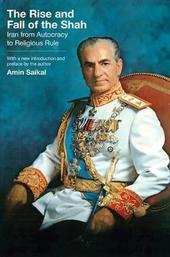
|
The Rise and Fall of the Shah: Iran from Autocracy to Religious Rule
Paperback / softback
Main Details
| Title |
The Rise and Fall of the Shah: Iran from Autocracy to Religious Rule
|
| Authors and Contributors |
By (author) Amin Saikal
|
| Physical Properties |
| Format:Paperback / softback | | Pages:328 | | Dimensions(mm): Height 235,Width 152 |
|
| Category/Genre | Asian and Middle Eastern history |
|---|
| ISBN/Barcode |
9780691140407
|
| Classifications | Dewey:955.053 |
|---|
| Audience | | Tertiary Education (US: College) | | Professional & Vocational | |
|---|
| Edition |
Revised edition
|
| Illustrations |
3 Maps
|
|
Publishing Details |
| Publisher |
Princeton University Press
|
| Imprint |
Princeton University Press
|
| Publication Date |
1 March 2009 |
| Publication Country |
United States
|
Description
On November 4, 1979, when students occupied the American Embassy in Tehran and subsequently demanded that the United States return the Shah in exchange for hostages, the deposed Iranian ruler's regime became the focus of worldwide scrutiny and controversy. But, as Amin Saikal shows, this was far from the beginning of Iran's troubles. Saikal examines the rule of Mohammad Reza Shah Pahlavi, especially from 1953 to 1979, in the context of his regime's dependence on the United States and his dreams of transforming Iran into a world power. Saikal argues that, despite the Shah's early achievements, his goals and policies were full of inherent contradictions and weaknesses and ultimately failed to achieve their objectives. Based on government documents, published and unpublished literature, and interviews with officials in Iran, Britain, and the United States, The Rise and Fall of the Shah critically reviews the domestic and foreign policy objectives--as well as the behavior--of the Shah to explain not only what happened, but how and why. In a new introduction, Saikal reflects on what has happened in Iran since the fall of the Shah and relates Iran's past to its political present and future.
Author Biography
Amin Saikal is professor of political science and director of the Centre for Arab and Islamic Studies (Middle East and Central Asia) at the Australian National University. His recent books include "Islam and the West: Conflict or Cooperation?" and "Modern Afghanistan: A History of Struggle and Survival".
Reviews"A sober, scholarly study of the place of Iran in world politics, of the 53-year reign of the Pahlavi family and of the effects of Mohammed Reza Pahlavi's dependence on the United States."--New York Times "[A] scholar's measured assessment, based on knowledge of the country and of Persian sources, and skillful in its interweaving of domestic and international factors."--Foreign Affairs "[T]he best single volume on contemporary Iran."--Shahram Chubin, International Affairs "Saikal's book achieves a high level of specificity and detail while remaining easily readable and therefore it is a handy academic resource as well as an accessible text for a general audience."--Pascal Abidor, Political Studies Review "Saikal updates this edition with an excellent introduction devoted to the dynamics of contemporary politics in the Islamic Republic and Iran's nuclear ambitions... [T]his study, still timely after three decades, naturally invites comparisons between the autocratic shah and his equally repressive successors."--Jonathan G. Katz, The Historian
|